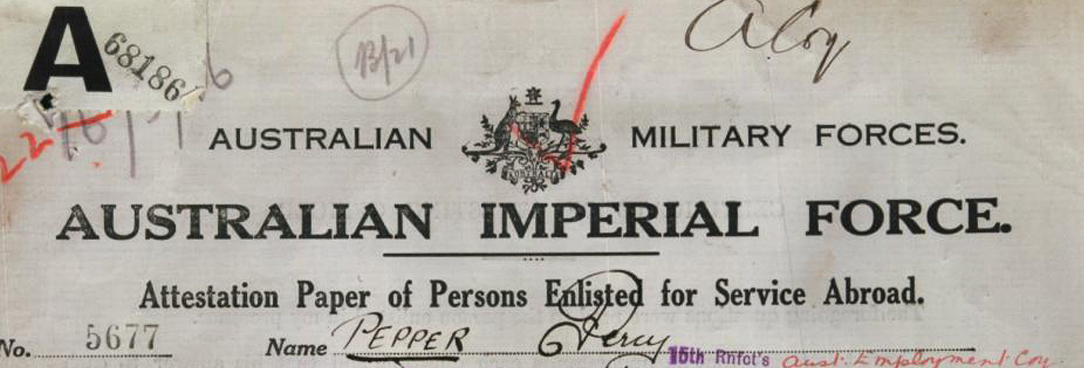Percy’s war
Links between 'Percy's war' and the Victorian History Curriculum and VCE Australian History are listed below. Linkages with the Civics and Citizenship curriculum is also included on this page.
Victorian History Curriculum Levels 9 and 10
Australia and Asia
Students investigate the history of either Australia and/or an Asian society in the period 1750-1918.
-
Key social, cultural, economic, and political features of one society at the start of the period (VCHHK133)
-
Intended and unintended causes and effects of contact and extension of settlement of European power(s), including Aboriginal and Torres Strait Islander peoples (VCHHK134)
-
Significant events and influencing ideas in the development of the society, including different perspectives of the events at the time and different historical interpretations and debates (VCHHK135)
-
Patterns of continuity and change and their effects on influencing movements of people, ways of life and living conditions, political and legal institutions, and cultural expression around the turn of the twentieth century (VCHHK136)
-
Different experiences and perspectives of non-Europeans and their perspectives on changes to society, significant events, ideas, beliefs and values (VCHHK137)
-
Position of the society in relation to other nations in the world by 1918 including the effects of ideas and movements of people (VCHHK138)
Australia at war (1914 - 1945): World War I
- Causes of World War I, the reasons why men enlisted to go to war, and how women contributed in the war effort (VCHHK139)
- Significant places where Australians fought and explore their perspectives and experiences in these places (VCHHK140)
- Significant events, turning points of the war and the nature of warfare (VCHHK141)
- Effects of World War I, with a particular emphasis on the changes and continuities brought to the Australian home front and society (VCHHK142)
- Different historical interpretations and contested debates about World War I and the significance of Australian commemorations of the war (VCHHK144)
Rights and freedoms (1945 - the present)
- Significance of the Universal Declaration of Human Rights, including Australia's involvement in the development of the declaration (VCHHK151)
- Causes of the struggle of Aboriginal and Torres Strait Islander peoples for rights and freedoms before 1965 (VCHHK152)
- Effects of the US civil rights movement and its influence on Australia (VCHHK153)
- Significance of the following events in changing society: 1962 right to vote federally, 1967 Referendum, Reconciliation, Mabo decision, Bringing Them Home Report (the Stolen Generations), the Apology and the different perspectives of these events (VCHHK154)
- Effects of methods used by civil rights activists to achieve change for Aboriginal and Torres Strait Islander peoples, and the role of one individual or group in the struggle (VCHHK155)
- Continuity and change for Aboriginal and Torres Strait Islander peoples in securing and achieving civil rights and freedoms in Australia (VCHHK156)
VCE Australian History
Unit 3: Transformations: colonial society to nation
Area of Study 2 - Making a people and a nation 1890-1920
- The extent to which the visions of 'White Australia', a 'workingman's paradise' and a 'social laboratory' had become reality by 1914, including the position of Aboriginal peoples, non-British immigrants, women and workingmen's families
- The ways in which World War I confirmed, added to or disrupted the visions underpinning the new nation, including ideas of identity, the political and sectarian outcomes of the conscription debates, and consequences for women, families and returned soldiers
http://www.vcaa.vic.edu.au/Documents/vce/history/HistorySD-2016.pdf
Civics and Citizenship Levels 7 and 8
Laws and Citizens
- Compare how laws are made in Australia, including through parliaments (statutory law) and courts (common law), and explain different types of laws, including executive law (delegated law), criminal law, civil law and the place of Aboriginal and Torres Strait Islander customary law (VCCCL023)
Citizenship, Diversity and Identity
- Identify how values can promote cohesion within Australian society, including the values of freedom, respect, inclusion, civility, responsibility, compassion, equality and a 'fair go' (VCCCL025)
- Explain how groups express their identities, including religious and cultural identity, and how this expression can influence their perceptions of others and others' perception of them (VCCCL026)
- Examine how national identity can shape a sense of belonging and examine different perspectives about Australia's national identity, including Aboriginal and Torres Strait Islander peoples' perspectives (VCCCL027)
Civics and Citizenship Levels 9 and 10
Laws and Citizens
- Explain how Australia's international legal obligations shape Australian law and government policies, including in relation to Aboriginal and Torres Strait Islander peoples (VCCCL032)
